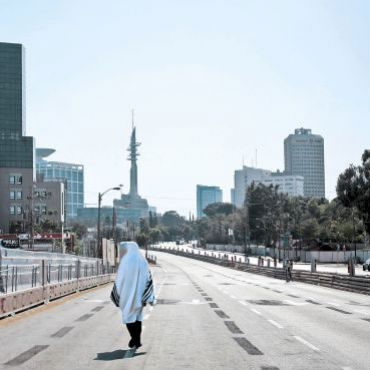Steve Kelman takes a break from acquisition and IT to report on his latest travels.

Tel Aviv streets were nearly deserted on Yom Kippur (Photo: Steve Kelman)
The weather this time of year in Tel Aviv, Israel, is heavenly – high 70's (for non-U.S. readers, about 25 C.), cloudless blue skies and low humidity. (Low humidity for us, anyway -- some Israeli friends actually thought it was "quite" humid. Everything is relative in the middle of a desert.)
Israelis often call Tel Aviv "the bubble," a more fun-loving, beachgoing, secular, politically liberal city, with a large and "out" gay community -- Israel's California. This in contrast to the more religious, and religiously divided, Jerusalem, with many ultra-Orthodox Jews along with militant Muslims, contending over the same holy places.
A whirlwind of impressions from a short trip:
1) Spending an entire day walking around the city, I was amazed to see hardly a single policeman anywhere. Given the risk of terrorism, how was this possible?
Two Israeli friends provided the same answer: There are plainclothes security people everywhere, for apparently it is believed that an invisible police presence is more effective than a visible one.
Also, one sees large numbers of young soldiers, in uniform, everywhere on the streets. A small number carry submachine guns, but most are seemingly just with backpacks (varied in color and design, not standard issue), presumably out and about, or headed home on leave. (Israeli boys all serve for three years, girls for two, drafted at 18 and starting university only after military service.) They presumably add a security presence.
2) There was a fascinating article in The Jerusalem Post about air pollution in Tel Aviv and Jerusalem on Yom Kippur, the annual Jewish religious fast day in early October. In Israel, even non-religious people who do not themselves fast pretty much universally respect the cultural norm that one should not drive or be out working or having fun. So major highways, normally jammed with traffic, are totally deserted. What fascinated me is that pollution readings on that day this year showed pollution down 99 percent. It was an amazing statement both about the role of car exhaust in creating pollution in cities, and about how acute, rather than chronic, a problem pollution is -- you can dramatically reduce levels with one day of no driving.
3) The American consumer brand presence here is surprisingly modest. Lots of Coke, but only a smattering of McDonald's and not a single Starbucks. (Apparently the latter brand never took off in Israel, and the six outlets opened in 2001 were closed two years later.) However, U.S. high-tech brands are prominent, in the first instance as employers. Take the main north-south highway along the Mediterranean coast just north of Tel Aviv, and you'll see, close to the sea, a modern, colorful industrial park complex with bright, large logos from Google, Microsoft and other tech icons, which have a big R&D presence in the country.
4) Although Israelis complain a lot about burgeoning inequality in the country, egalitarian traditions here, compared to many other places, remain a very important part of Israel's historic "labor Zionist" culture. The Azrieli Mall, considered an upscale consumerist mecca, is very midscale by U.S. standards, feeling less like the D.C. area's Pentagon City or Tysons II than like the Mall of America (or at least my impression of what the Mall of America is like, as I've never actually been there).
Unlike most other major cities, you don't see outlets of the big European luxury brands such as Louis Vuitton or Prada lining any of the fashionable streets downtown; I wasn't sure they existed at all, though I found out through Google that there is one strip in an upscale suburb that apparently has several of these.





